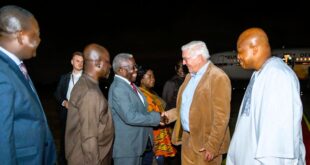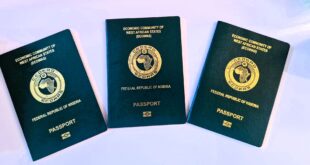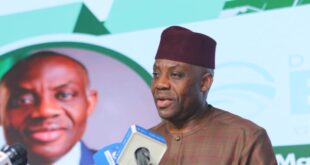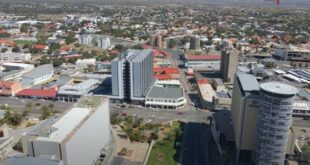Africa’s most populous country’s 170 million people are equally divided among Muslims and Christians. Northern Nigeria, however, has a majority Muslim population and it is the region that has been plagued by Boko Haram terrorism in the past five years. Thousands have been killed by the Islamist terrorists and hundreds of thousands more forced out of their homes.

Maria Lozano of the international Catholic charity Kirche in Not (Aid to the Church in Need) speaks in an exclusive interview with Archbishop Ignatius Ayau Kaigama, the Bishop of the central Nigerian Diocese of Jos and the chairman of the Catholic Bishops’ Conference of Nigeria. The 57-year-old clergyman talks about the ongoing fight against terrorism and corruption in Nigeria and the situation of the Catholic Church in the country.
A Muslim, Muhammadu Buhari, was elected President of Nigeria in March 2015. What is the situation today, more than one year after he took office?
It was the first time that a sitting president would be defeated in Nigeria and Goodluck Jonathan accepted his defeat. And against the prediction of pessimists who had foretold the country breaking up and descending into a civil war, everything was peaceful. We needed change and it came in the person of President Buhari. He has been in office for a year now and we would like to give him the opportunity to redeem his promise to fight corruption and terrorism.
As the chairman of the Catholic Bishops’ Conference of Nigeria you sent a message to the President in which you called on him to ensure that every citizen should be free to continue to practise their religion. Is religious freedom in danger in Nigeria?
Religious discrimination is unfortunately a daily reality, especially in northern Nigeria. There are examples of villages with several mosques but the Christians have to worship in school classrooms. Christians are not allowed to acquire land to build churches.
The Muslim pupils receive religious lessons but Christians are not offered any. This discrimination is destructive. We want everybody to be strengthened in their religious identity. The values of our religions should be changed for the good of all. That is the only way we can build a better Nigeria.
What is the position of the government on religious freedom?
Before the elections, there were unsettling reports that Muhammadu Buhari would further the Islamisation of the country. We, the Catholic bishops of Nigeria, invited him shortly before the election and asked him directly: “Are you a religious fanatic?” He said no and added that it would be foolish to believe that one religion could dominate the others in Nigeria. Everybody should be able to practise their faith without discrimination or hostility as we have often experienced in the past, he assured.
Your message to the president was about corruption and Boko Haram. Why do you consider both equally dangerous?
Because both have undermined the whole identity of Nigeria. If you give Boko Haram an inch of space, you destabilise the country. Corruption has been around much longer than Boko Haram. It causes the same damage. It eats deep into the system, prevents progress and plunges people into ruin. Violence and new conflicts are the result.
Is the government on the right path to defeat Boko Haram?
Absolutely. We’ve been praying for long for the oppressed Nigeria. We have also been praying for long against corruption. God has answered our prayers: corruption is being fought and Boko Haram has been beaten back.
When one speaks about Boko Haram, many people think about the Chibok girls. Since April 2014, the schoolgirls have been in the custody of the terrorists. One of them recently escaped to freedom. What is the current situation?
The story makes the heart of every Nigerian bleed. It is so sad. The government has tried to free the girls. We are more optimistic than ever that, with God’s help, more of the girls will come back home.
You have 60 candidates for the priesthood in your diocese in Jos. Hundreds of young men are studying in the seminary to become missionaries. In Europe, the situation looks totally different!
We thank God for the gift of calling. We cannot even take all the applicants. We have a very strict selection process and we take it very seriously. Our churches are full. I thank Kirche in Not for the support for our seminarians and catechists. You have always been there for us even in difficult situations. We would like to give something back from what the missionaries from Europe brought to us. The Western world should have no fears in asking us for help. We don’t have money but we can help with our priests. We’re ready to do that.
….
Editor’s Note: Kirche in Not (Aid to the Church in Need) is an international Catholic charity under the authority of the Holy See
 THE AFRICAN COURIER. Reporting Africa and its Diaspora! The African Courier is an international magazine published in Germany to report on Africa and the Diaspora African experience. The first issue of the bimonthly magazine appeared on the newsstands on 15 February 1998. The African Courier is a communication forum for European-African political, economic and cultural exchanges, and a voice for Africa in Europe.
THE AFRICAN COURIER. Reporting Africa and its Diaspora! The African Courier is an international magazine published in Germany to report on Africa and the Diaspora African experience. The first issue of the bimonthly magazine appeared on the newsstands on 15 February 1998. The African Courier is a communication forum for European-African political, economic and cultural exchanges, and a voice for Africa in Europe.

































